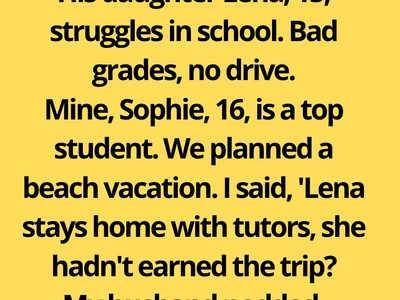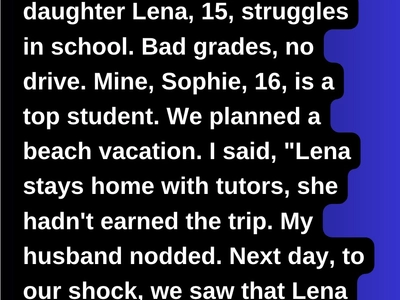I Refused to Take My Stepdaughter on Vacation — Then I Saw What She Did at 5 AM
My husband and I both came into our marriage with children from previous relationships. His daughter, Lena, is fifteen. My daughter, Sophie, is sixteen. The girls are close in age, but in almost every other way, they couldn’t be more different.
Sophie has always been the kind of student teachers love — disciplined, ambitious, always aiming for the top. Her notebooks are neat, her essays thoughtful, her goals already mapped out in color-coded lists. She thrives on challenges, sees obstacles as puzzles to solve.
Lena, on the other hand, has always struggled. School for her is like trying to run in water — she moves, but slowly, heavily, as though something invisible is holding her back. Her grades had been slipping for months. She wasn’t lazy, but she seemed lost, unmotivated. Every report card became another reminder that she wasn’t meeting expectations — hers, her teachers’, or ours.
When summer approached, my husband and I decided to plan a family beach vacation. It was meant to be a chance for us all to relax and connect, to escape the tension that had quietly been building in our home. But when I looked at Lena’s recent grades, frustration bubbled up.
I remember saying, “Maybe Lena should stay home and work with her tutors. She hasn’t earned the trip.”
My husband hesitated. He didn’t like the idea — I could see it in the way his shoulders stiffened and his jaw tightened. But he didn’t argue. He just sighed and said, “If you think that’s what’s best.”
That night, I went to bed feeling certain I was right. I told myself it wasn’t punishment — it was accountability. Sophie had worked hard and earned her break. Lena hadn’t. It seemed simple.
But life has a way of humbling you when you least expect it.
The next morning, I woke up early to make coffee. It was barely dawn. The house was silent except for the faint hum of the refrigerator. As I walked toward the kitchen, I noticed a dim light spilling across the floor.
There, at the table, sat Lena.
It was 5 a.m. She was surrounded by notebooks and textbooks, her hair messy, eyes red from exhaustion. A half-empty mug sat beside her, probably filled with the instant coffee she wasn’t supposed to drink.
She jumped when she saw me, startled, and quickly closed her book as if caught doing something wrong.
I didn’t say a word at first. I was too surprised.
Then she whispered, “I know I’m not like Sophie… but I really want to go. I’ve been trying. I just don’t get things as fast.”
Her voice was small — not angry, not defensive — just tired. Tired of failing, tired of disappointing, tired of being compared.
Something in me cracked right then.
All this time, I’d been measuring her value through performance — through letters on a page — without seeing the quiet fight behind her eyes. I had mistaken struggle for indifference.
Before I could respond, Sophie came down the stairs, rubbing her eyes.
“She’s been up all night,” Sophie said. “We studied together until one. She wanted to understand the algebra stuff before her test next week.”
Sophie’s tone wasn’t smug. There was no competition in it. Just simple admiration.
Over the next few days, I watched Lena transform. It wasn’t dramatic — no overnight miracle. But something had shifted inside her. She woke up early every morning, studied with Sophie, and even joined her tutoring sessions without being asked.
One evening, she brought her notebook to me and said, “Can you quiz me on this?”
It took me a second to process the words. She wanted my help — the same person who’d just told her she didn’t deserve the trip.
I nodded and sat beside her. We went over questions together, and every time she got one right, she smiled shyly, like she wasn’t sure if she was allowed to be proud.
The house began to feel different — lighter somehow. Even my husband noticed. The tension that had been simmering between us eased. We’d all been walking on eggshells around Lena, not realizing how deeply she felt our disappointment. Now there was laughter again. Sophie encouraged her. I encouraged her. And slowly, Lena began to encourage herself.
A week later, her test results came back.
She hadn’t aced it. But she passed — for the first time in months.
When she handed me the paper, her hands trembled slightly, as though she was bracing for criticism instead of praise.
I looked at her, at that nervous face waiting for judgment, and all I could think was how unfair I’d been.
Instead of lecturing her, I stood up and hugged her.
“You earned more than a trip,” I said softly. “You earned a chance to believe in yourself again.”
She froze for a moment, and then she started crying — quiet, shaky tears against my shoulder.
My husband joined us, wrapping his arms around both of us, and for the first time, it felt like we were truly a family. Not “his daughter” and “my daughter.” Just our girls.
We decided to go on the beach trip after all — the four of us together. Not because of grades or merit, but because it felt like the right time to celebrate something deeper than achievement.
On the drive there, Lena sat in the back seat with her headphones on, smiling faintly as she watched the world pass by. Sophie leaned against the window beside her, and at one point, I caught them sharing a quiet laugh about something I couldn’t hear. It felt good — natural.
At the beach, Lena was different again. She still carried her books, still studied a little each morning, but not out of fear. Out of choice. And when she wasn’t studying, she was laughing — splashing in the water, chasing seagulls with Sophie, her face glowing with that easy joy only teenagers have when they forget the world is watching.
One night, we built a small bonfire on the sand. The stars were out, and the ocean whispered against the shore in that slow, endless rhythm that makes you feel both small and safe at the same time.
Lena sat beside me, hugging her knees. For a while, we didn’t speak. Then she said, almost to herself, “I’m going to keep trying. Not for a trip… just for me.”
I felt tears prick at my eyes again, but this time they were happy ones.
That was the real victory — not the passing grade, not the vacation, but the spark that had come back into her.
Because what I’d learned was this: effort deserves recognition, even when results take time. Not every success can be measured in numbers or letters. Sometimes success looks like a tired fifteen-year-old waking up at dawn because she finally believes she can be better than she was yesterday.
After that trip, Lena kept studying hard. She still had ups and downs, but the difference was that now she faced them with resilience. Sophie helped her when she could, and the two of them began to build a bond that surprised both my husband and me.
One afternoon a few months later, I found them at the kitchen table again — the same place where I’d first seen Lena at five in the morning. But this time, they were laughing over a pile of math problems, teasing each other about wrong answers.
Sophie looked up and said, “Mom, Lena’s getting better than me at this.”
Lena grinned. “That’s not true.”
“It is,” Sophie insisted, bumping her shoulder playfully.
Watching them, I realized how wrong I’d been to ever compare them. They weren’t rivals. They were two girls navigating different paths, each learning in their own way.
And I — the adult — had been the one who needed to learn the biggest lesson of all.
Parenting isn’t about rewarding perfection or punishing imperfection. It’s about recognizing effort, nurturing confidence, and creating space for growth — even when it comes slowly. Especially when it comes slowly.
I used to think fairness meant treating them the same. Now I understand that fairness means seeing them as they truly are — different, unique, deserving of patience and love in their own way.
The next time report cards came around, Lena showed hers to me without hesitation. She wasn’t top of the class, but her grades had improved across the board. She was proud, and I was proud of her.
She asked, “Do you think I can ever be as good as Sophie?”
I smiled and said, “You don’t need to be as good as anyone else. You just need to keep being better than you were yesterday.”
She nodded, thoughtful, then went back to her books.
Sometimes, I still think about that morning when I almost told her she couldn’t come with us. How close I came to reinforcing the idea that her worth depended on results. It makes me shiver. Because if I’d stuck to that, I might have broken something in her that would take years to repair.
But instead, I got to witness her rise. Not because someone handed her an opportunity, but because she decided she was worthy of one.
Since then, we’ve had other vacations, other report cards, other challenges. But that trip — that first family trip as four — remains the one I remember most vividly. It wasn’t about the beach or the sun or the laughter. It was about a quiet turning point.
It was about a girl who thought she wasn’t good enough realizing she was — and a woman who thought she was teaching a lesson realizing she was the one learning it.
And sometimes, when the house is quiet and I walk past the kitchen, I still see it in my mind: Lena at that table in the half-light of morning, head bent over her notebook, refusing to give up.
That image stays with me — a reminder that effort, even when unseen, is still a kind of courage. And love, when finally recognized, can change everything.






